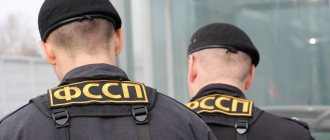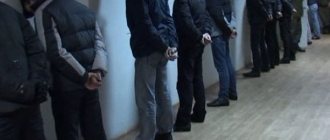Organization
It is one of the key features of associations, the creation of which is punishable under Art. 210 CC.
Organization is considered to be a clear distribution of specific roles and functions among participants, providing criminal activities with means and tools, establishing connections with government officials and other corrupt officials, ensuring the safety of the community, and the presence of a unified material base.
Here it is advisable to talk about one more sign of a community/organization - cohesion. It is not directly stated in Art. 210 of the Criminal Code, however, it is implied. We can talk about cohesion insofar as the participants perform actions together and by agreement.
Features of the structure
Part 4 of Article 35 of the Code establishes that a crime is considered committed by a criminal community/organization if a structured group or an association of several groups carrying out illegal actions under a single leadership is involved in it. Members of such structures unite exclusively to commit serious, especially serious acts that involve deriving (directly or indirectly) financial and other material benefits.
The association referred to in Art. 210 of the Criminal Code of the Russian Federation, differs from other criminal groups, organized, among other things, by a complex internal hierarchy, the presence of a common goal, which is to conduct joint criminal activities, as a result of which the illegal circulation of other people's valuables is carried out in favor of its members.
Objective aspect
Its signs are established in Part 1 of Art. 210 CC. The objective aspect includes:
- Formation of a criminal association for the subsequent commission of acts (serious or especially serious).
- Management of such an association or divisions included in it.
- Formation of stable ties between organized groups operating independently or division of spheres of influence (territories) and illegal income between them.
- Participation in meetings of leaders, managers, and other representatives of the criminal association.
- Community/Organization Involvement.
The practice of excluding the qualifying feature “group of persons” when considering criminal cases by courts
The article analyzes judicial practice, analyzes court verdicts on the application of rules on complicity, and reveals the content of the qualifying feature “criminal community (criminal organization).”
Key words: group of persons, organized group, qualifying feature, crime, sentence, court.
The article analyzes the judicial practice, analyzes the sentences of the courts on the application of the rules of complicity, reveals the content of the qualifying feature “criminal community (criminal organization)”.
An analysis of judicial and prosecutorial practice shows that a fairly common phenomenon when courts consider criminal cases is the latter’s exclusion of the qualifying attribute “group of persons” when considering criminal cases.
The reason for this fact is the insufficient level of preliminary investigation of criminal cases, including the lack of a sufficient evidence base to impute this qualifying feature.
Thus, an analysis of criminal law statistics established that in the period from 2013 to 2016, not a single person occupying a senior position in the criminal hierarchy was convicted under Part 4 of Article 210 of the Criminal Code of the Russian Federation. The qualifying feature “committing a crime as part of an organized group” is excluded from the charges of almost every fourth convicted person [3].
An analysis of emerging practice showed that the reason for this is the costs of operating operational services. As a result, according to their developments, most criminal cases are initiated not in connection with the creation and participation in organized criminal groups, but for specific acts committed by members of criminal groups.
The current situation is due, among other things, to the fact that the authorities carrying out operational investigative activities do not pay sufficient attention to documenting the signs inherent in an organized group and criminal community, enshrined in parts 3 and 4 of Article 35 of the Criminal Code of the Russian Federation.
As a rule, during the investigation, investigators focus on collecting evidence on identified crimes committed by members of a criminal association, mistakenly believing that this is enough to charge them with a criminal act as part of an organized group or criminal community.
In connection with the above, there are not isolated cases when the court does not find confirmation of such signs as the stability of an organized group, cohesion, the presence of a hierarchy and structure within groups that are part of a criminal community, the stability of the composition of participants, the close relationship between them, the consistency of their actions, constancy of forms and methods of criminal activity, duration of existence, careful planning and preparation for committing crimes, distribution of roles and income received from criminal activity.
As noted in the Resolution of the Plenum of the Supreme Court of the Russian Federation dated June 10, 2010 No. 12 “On judicial practice in considering criminal cases involving the organization of a criminal community (criminal organization) or participation in it (it)”, based on the provisions of Part 4 of Article 35 of the Criminal Code of the Russian Federation (criminal community ( criminal organization) differs from other types of criminal groups, including an organized group, by a more complex internal structure, the presence of a goal of jointly committing grave or especially grave crimes in order to obtain directly or indirectly financial or other material benefits, as well as the possibility of uniting two or more organized groups for the same purpose. It is noted that a criminal community (criminal organization) can carry out its criminal activities either in the form of a structured organized group, or in the form of an association of organized groups operating under a single leadership. The association of organized groups presupposes the presence of a single leadership and stable ties between independently operating organized groups, joint planning and participation in the commission of one or more serious or especially serious crimes, and the joint performance of other actions related to the functioning of such an association. In turn, the creation of stable connections between various independently operating organized groups should be understood, for example, as the actions of a person to unite such groups in order to carry out joint actions to plan, commit one or more serious or especially serious crimes.
As stated above, the presence of these mandatory features is often not confirmed when criminal cases are considered by the court.
For example, the investigative bodies of the Federal Drug Control Service of Russia in the Vladimir Region have charged M. with a number of attempts at illegal sale of narcotic drugs on a large and especially large scale (7 crimes in total) committed as part of an organized group.
Having examined the presented materials of the criminal case, the court pointed out the lack of evidence indicating the presence of stability, cohesion, and distribution of roles. Marriage and family relations between M. and N., as well as the commission together with Z. of only one of the imputed crimes cannot, in his opinion, be regarded as the creation of an organized group for the systematic commission of criminal acts.
The Frunzensky District Court of Vladimir reclassified the actions of the convicts as committing attempts to sell narcotic drugs by a group of persons by prior conspiracy [6].
Investigators often do not clarify the nature of the relationships between community members, which does not allow the court to present evidence indicating the structured nature of the group, which is one of the signs of a criminal formation in the form of a community (relations within each structure, between structures).
Thus, the Altai Regional Court terminated criminal prosecution under Article 210 of the Criminal Code of the Russian Federation against Z. and others (5 people in total) who created a number of dens for prostitution in the city of Zarinsk, Altai Territory.
During the judicial investigation, it was established that, despite the organized nature of the activities of the designated individuals, their association did not reach the level of cohesion and organization that characterizes the criminal community.
In particular, there were no structural divisions; all members of the group were subordinate to one leader - Z., who was directly involved in the commission of crimes as a perpetrator. The indication in the charge brought at the stage of preliminary investigation that there was a structural division in the group was not confirmed in court.
Under such circumstances, the court terminated the criminal prosecution under Article 210 of the Criminal Code of the Russian Federation due to the lack of corpus delicti in the actions, finding the defendants guilty of kidnapping and human trafficking, involvement in prostitution, organizing prostitution, committed by an organized group [7].
Often, the exclusion of the qualifying criterion “committing a crime as part of an organized group” or the termination of criminal prosecution under parts 1, 2 of Article 210 of the Criminal Code of the Russian Federation is due to violations of criminal procedural legislation during operational search activities and investigative actions, which resulted in the recognition of evidence as inadmissible.
A typical example is the criminal case against T. and others (11 people in total), considered by the Moscow Regional Court.
The court pointed out violations committed during the personal search, drawing up inspection protocols (unspecified corrections, lack of information about interruptions in its production, failure to reflect the facts of the discovery of things, objects and documents subsequently recognized as material evidence), as well as during wiretapping of telephone conversations, failure to provide rights to protection. The violations committed were the basis for the court to declare a number of evidence collected in the case inadmissible, and therefore the accusation based on them was not confirmed in court.
It should be noted that in some cases the qualifying feature in question is excluded due to procedural violations that resulted in the recognition of evidence in criminal cases as inadmissible.
For example, when the prosecutor studied, in accordance with Article 221 of the Code of Criminal Procedure of the Russian Federation, a criminal case received with an indictment from the investigative service of the Federal Drug Control Service of Russia in the Orenburg Region, on charges of I., JI. and D. in the commission of several episodes of sale of narcotic drugs, the investigator’s omissions in terms of determining all the circumstances to be proven were not established.
As a result, the court of first instance excluded the qualifying feature “as part of an organized group” from the charges against the defendants, since the evidence available in the case did not confirm the existence of stable and organized relations between the accomplices. This group operated for a short period of time, there was no leader, and the defendants committed criminal offenses either independently or by prior conspiracy.
In another criminal case initiated against V. and others (6 people in total), the Tyumen Regional Court terminated criminal prosecution under parts 1 and 2 of Article 210 of the Criminal Code of the Russian Federation for lack of corpus delicti; the persons mentioned were convicted of preparation for sale and attempted sale narcotic drugs on a large and especially large scale, committed by an organized group. The court did not find such signs characterizing a criminal organization as the cohesion of the participants, their awareness of the common goals of functioning, the presence of management structures, a common material and financial base formed, inter alia, from contributions from criminal activities, hierarchy and discipline, established rules of relationships and behavior of participants [5].
The above facts indicate in their entirety that the preliminary investigation authorities often do not ensure the collection of a sufficient evidence base in criminal cases that allows persons brought to criminal liability to be charged with committing a crime under Article 210 of the Criminal Code of the Russian Federation. At the same time, it is necessary to point out the omissions made when carrying out operational investigative activities to document the commission of crimes by the criminal community. In the conditions under consideration, strengthening prosecutorial supervision is required, both over the activities of the preliminary investigation bodies and over the activities of law enforcement departments carrying out the preliminary investigation. A proper assessment by the prosecutor of compliance with legal requirements at each of these stages is one of the key guarantees of a positive result in the courts’ consideration of criminal cases of this category.
In addition, it should also be noted that if the commission of a crime under Article 210 of the Criminal Code of the Russian Federation is not confirmed in court, criminal prosecution against the person to whom such charges were brought is subject to termination on rehabilitative grounds, respectively, in accordance with Article 134 of the Criminal Procedure Code of the Russian Federation for the latter The right to rehabilitation is recognized, which is expressed in compensation to a person unreasonably subjected to criminal prosecution for both property and moral damage at the expense of the federal budget.
Thus, the high-quality implementation of operational investigative activities, preliminary investigation, as well as prosecutorial supervision will contribute not only to bringing the perpetrators to justice, but also to the effective use of budget funds.
Literature:
- Criminal Code of the Russian Federation dated June 13, 1996 No. 63-FZ (as amended on August 2, 2019).
- Criminal Procedure Code of the Russian Federation dated December 18, 2001 No. 174-FZ (as amended on August 2, 2019) (as amended and supplemented, entered into force on August 13, 2019).
- Information letter of the General Prosecutor's Office of the Russian Federation dated March 31, 2016 No. 36–47–2016.
- Resolution of the Plenum of the Supreme Court of the Russian Federation dated June 10, 2010 No. 12 “On judicial practice in considering criminal cases involving the organization of a criminal community (criminal organization) or participation in it (it).”
- Verdict of the Tyumen Regional Court dated May 17, 2011.
- Verdict of the Frunzensky District Court of Vladimir No. 1–107/2014 dated 09/04/2014 in case No. 1–107/2014.
- Sentence No. 2–1/2014 2–2/2013; 2–3/2012; 2–36/2011 dated January 31, 2014 in case No. 2–1/2014 Altai Regional Court.
- Shesler A.V. Complicity in crime. Tyumen, 2007.
Press service
According to the Judicial Department of the Supreme Court, in 2022, every third person accused of creating a criminal community or participating in it (Article 210 of the Criminal Code of the Russian Federation) was acquitted by the court. Despite the fact that the total share of acquittals in Russia was only 0.2%.
We spoke with the Ombudsman on issues related to violations of the rights of entrepreneurs during the application of preventive measures and the execution of sentences, the head of the Association for the Defense of Business, and a member of the Federal Political Council of the Party of Growth, Alexander Khurudzhi.
Have the amendments to the Criminal Code of the Russian Federation affected the statistics, according to which the founders, managers and employees of a company cannot, solely because they work in a structure that has committed an economic crime, be subject to criminal liability for participation in an organized crime if the company was not created for the purpose of committing crimes?
— I’ll start with the most recent example under Article 210. On June 10, the judicial panel of the Moscow City Court commuted the sentences of 5 entrepreneurs from Belgorod who were on Boris Titov’s Russian list. These people will be released in 2 weeks, on June 29, without leaving for a colony. In total, they spent exactly 5 years in pre-trial detention center. How did this become possible in violation of all norms of the Code of Criminal Procedure? Just “thanks” to Article 210. The entrepreneurs were detained under Section 160, and a year later, when all legal deadlines for extending the detention had expired, Section 210 appeared in their case. The investigation and the court, when extending the guard, made conclusions about an organized criminal community based on photographs from the celebration of Power Engineer’s Day. There are joint photos - there are also OPS. When the verdict was announced, the 210th, as we say, “fell off.” They could not prove its existence, and they did not try, since it had fulfilled its function, the entrepreneurs were not at large, but in a pre-trial detention center. The illegality of their detention from 2015 to 2022 was recognized by the ECHR, then confirmed by the Presidium of the Supreme Court, then by the 2nd Court of Cassation, Russia agreed to pay compensation in this case of 7.5 thousand euros. But neither the investigator who “drew” this article, nor the judges who extended the arrest so many times, bore any responsibility.
In 2022, according to our applicants alone, there were 4 such cases when the 210th did not stand up in court and was used exclusively to keep those arrested in a pre-trial detention center. There are many more such cases throughout the country.
On the other hand, is it worth considering these statistics seriously: the office of the business ombudsman has repeatedly said that Article 210 of the Criminal Code of the Russian Federation is charged with the aim of putting pressure on entrepreneurs, delaying the process and choosing a more severe preventive measure, while often the article for criminal offenses is excluded from the charges as excessively imputed, but the defendants still receive sentences under other articles (for example, fraud)? That is, isn’t 210 of the Criminal Code of the Russian Federation just a way of putting pressure on business, and not the ultimate goal of the investigation?
— Thanks to business ombudsman Boris Titov, who repeatedly drew attention to the unlawful use of this article to intimidate entrepreneurs, it was possible to partially reverse the situation; now the investigation needs to prove that the OPS was created for a criminal purpose, and it cannot use the organizational and legal structure as evidence ordinary companies. But this clause only worked for newly initiated cases; for those who are already in pre-trial detention center 210, the situation has changed little. The court is bound by previous extensions of custody and rarely changes its position before hearings on the merits. However, we continue to change the situation both targeted, through appeals, and in general, working with legislators and public institutions.
From June 1, 2022, in the courts of the subject level (Moscow City Court), a professional judge and a panel of 8 jurors, at the request of the accused, consider criminal cases of crimes under Part 4 of Art. 210 of the Criminal Code of the Russian Federation. Could the jury trial of this category of cases also influence the positive trend?
“Trying these types of cases to juries could certainly change the situation as well.” However, it is too early to draw conclusions now; the number of such reviews is too small to see the overall picture. In the future, when there are hundreds of cases, perhaps we will understand the trend. While jury trials please us for another reason: the number of acquittals. If in an ordinary court the acquittal rate is slightly more than 0.2%, then the jury acquits 100 times more often, about 25%.
In this regard, perhaps it is better to consider the number of cases brought under Article 210, rather than acquittals under them? What measures need to be taken so that the authorities pay attention to the amendments to Article 210 of the Criminal Code of the Russian Federation and, at the stage of preliminary investigation, terminate the proceedings in the case or completely refuse to initiate a criminal case even at the stage of verifying the report of a crime?
— It is, of course, more correct to count the number of cases initiated under Article 210, and not the number of sentences. But I'm afraid that this will not change the situation radically. It must be changed through the responsibility of investigators. If the investigator understands that he will be personally responsible for the unconfirmed 210, then something will change. Let's return to the case that I spoke about at the very beginning of our conversation, where the investigator made a career during the criminal case and rose to the rank of general.
June 15, 2020
Close
We are on social media networks
Management
It should be understood as the implementation of managerial or organizational functions in relation to the association as a whole, structural divisions or specific participants both during attacks and when ensuring criminal activity.
The guide assumes:
- Defining goals, developing a general plan for illegal actions.
- Preparation for committing certain acts.
- Conducting other activities aimed at achieving a criminal goal.
In the latter case, we are talking, in particular, about:
- Distribution of roles between subjects included in the community/organization/unit.
- Taking safety measures.
- Developing methods for committing acts, ways to hide traces.
- Distribution of funds obtained from a crime.
- Legalization of money obtained illegally.
- Introducing members of the association into government agencies, recruiting new members.
Organized criminal entrepreneurs
If we consider the dynamics of the application of Article 210 over the past seven years, a noticeable decrease in the number of sentences in 2013 is striking: if since 2009, approximately 40-60 cases were initiated per year under Part 1 and 130-150 cases under Part 2, then in 2013, only 37 people were convicted under Part 1 of Article 210, and 59 people under Part 2. Two more people received sentences under Part 3 of Article 210. Then, starting in 2014, the statistics of cases of “criminal communities” brought to court again shows an increase: 56 sentenced under Part 1 and 107 convicted under Part 2 in 2014, in 2015- m - 61 and 148 people, respectively.
The business community and human rights activists believe that this statistical increase may be associated with the unlawful filing of charges under Article 210 against persons involved in so-called economic cases: fraud in the business sector, illegal banking activities, and the like. Since 2015, the Gulagu.net project has been collecting information about the illegal use of Article 210: with its help, the accused are “heavier” the charge in order to send them to a pre-trial detention center, extend the investigation period, and obtain the necessary testimony. At the same time, not all cases of organized crime reach the court unchanged: if there is no real evidence of the involvement of those arrested in a criminal community in the case, then this article is simply excluded from the final charge.
“Probably, about a third of the charges under Article 210 are overcharged,” agrees lawyer Zherebenkov. — The investigation always tries to “heavier” the charge and, for example, declares the accused who have only two elements to be a criminal community: one crime and one preparation. With such excessive imputation, civil legal relations are criminalized: all activities of the company, and not just criminal ones, are regarded as the activities of a criminal community.”
The Plenum of the Supreme Court allowed by its resolution to judge under Article 210 not only for crimes committed, but also for preparation for them, even if not a single real violation of the law was ultimately recorded. Moreover, a case can be brought for “preparation for the creation” of a criminal community itself - even if this community has not managed to either commit or prepare a single crime.
“In cases where the actions of a person aimed at creating a criminal community (criminal organization), due to their suppression by law enforcement agencies or due to other circumstances beyond the control of this person (persons), did not lead to the creation of a criminal community (criminal organization), they are subject to qualification under Part 1 or Part 3 of Article 30 of the Criminal Code of the Russian Federation and Part 1 of Article 210 of the Criminal Code of the Russian Federation as preparation for the creation or as an attempt to create a criminal community (criminal organization),” says the document adopted in 2010.
Pavel Agapov, a leading researcher at the Research Institute of the Academy of the Prosecutor General's Office of the Russian Federation, called both the article itself and the explanations given by the Supreme Court “far from legislative perfection” at a meeting with representatives of Business Russia in October of this year. The expert noted that any commercial organization became a potential target for the application of Article 210 after legislators changed the definition of an organized criminal community in 2009: in the old version of the article it was characterized as “cohesive”, in the new version the wording “structured” appeared.
Subjective part
It is characterized by direct intent. To impose punishment, there must be a special purpose - committing crimes of certain categories jointly.
A sane person over the age of 16 can be brought to justice under Parts 1, 2, 4. Citizens who committed crimes as part of an association at the age of 14-16 are punished if the relevant articles provide for the possibility of imposing sanctions from the age of 14.
Part 3 of Article 210 establishes a qualified staff with a special subject. This is a citizen who occupies a certain official position and uses it for criminal purposes. In this case, we are talking not only about the direct intentional unlawful exercise of powers by a person, but also about exerting influence on a subordinate subject for the latter to commit illegal actions.
Special subjects include officials and civil servants, employees of territorial government structures, citizens temporarily/permanently holding positions related to administrative, administrative and economic activities.






